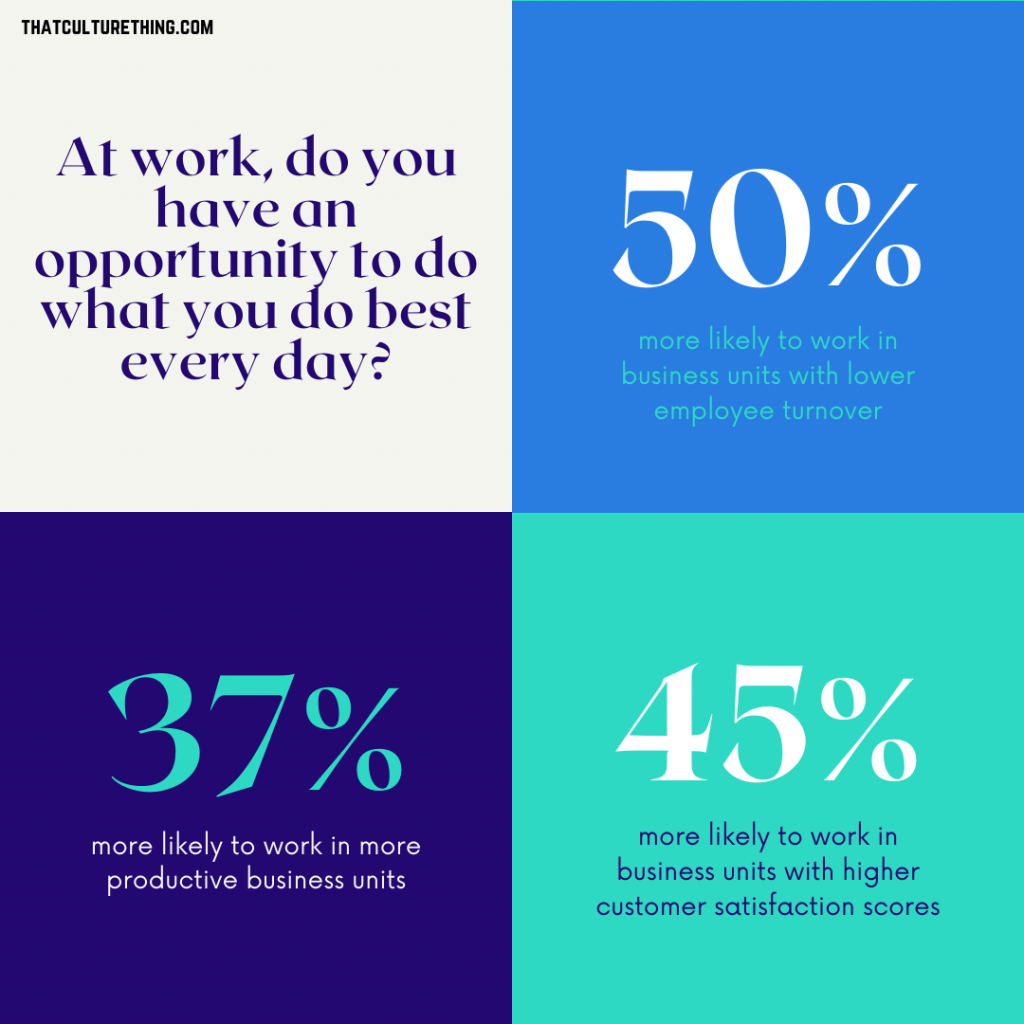Under influence of the belief that “good is the opposite of bad“, mankind has for centuries been fixated with fault-finding, weaknesses and failings. Doctors have investigated the causes of diseases in order to learn about health. Psychiatrists and psychologists have investigated sadness in order to learn about joy. Organisations have investigated their “areas of development” or “weaknesses” in order to develop and make themselves better places to work. And not only this, right from childhood we have been asked by our parents, teachers, colleagues or bosses to “fix” ourselves, to understand our ‘weaknesses’, so as to become stronger.
This advice is well intended but misleading. Of course, faults and failings deserve to be studied but they do not reveal anything about ‘Strengths’. Strengths are way different from weaknesses.
They are unique, innate personality traits. ‘Strengths’ have their own patterns.
A great organisation must not only accept the fact that each employee is different, it must also capitalise on these personality differences. It must keep a close view on each employee’s unique personality traits and then position and develop each employee such that his/her talent is transformed into powerful strengths. The organisation must channel the careers of its people around the strengths of each person. By doing so, the organisation will be able to greatly outperform its competitors.
According to Gallup’s latest meta-analysis where they asked some 200,000 employees working in 8,000 odd business units within 36 organisations, this question:
“At work, do you have an opportunity to do what you do best every day?”
They then compared the responses to the performance of the business units and discovered the following:

When employees answered “strongly agree” to this question, they were 50% more likely to work in business units with lower employee turnover, 37% more likely to work in more productive business units and 45% more likely to work in business units with higher customer satisfaction scores. And over time those business units that increased the number of employees who strongly agreed saw comparable increases in employee retention, productivity and customer loyalty.
This data clearly reveals that the organisations whose employees feel that their unique personality traits/strengths are used every day are more powerful and healthy.
According to Gallup’s total database, the question:
“At work, do you have an opportunity to do what you do best every day?” has been asked to more than 1.7 million employees in 100 companies from 65 countries.
And to their dismay, globally, only 20% of employees working in big organisations feel that their unique personality traits and strengths are actually being used. Most aberrant of all, the longer an employee stays with an organisation and the higher he climbs up the conventional career ladder, the less likely he is to strongly make use of his/her unique personality traits and strengths.
In order to utilize the organisation’s full potential and thereby increase their value, organisations need to dig deeper to find the wealth of unrealised capacity that is deep seated in each and every employee. Just imagine the increase in efficiency, productivity, and profitability if they doubled this number from 20 to 40 percent of their employees ‘strongly agreeing’ that they get a chance to use their unique personality traits and strengths every single day.
The next question is, how can this be achieved?
The first step is to figure out why 8 out of 10 employees feel that they are somewhat misfit for the job/role.
- Is this because of wrong recruitment?
- Is this because of selecting the right people for the wrong job?
- Or wrong people for the right job?
Research in this area has indicated that most organisations are built on the following flawed assumptions about people:
1. Each individual can learn to be proficient in almost everything.
2. Each individual’s greatest room for growth lies in his/her weaknesses or what we now call “Areas of Development”.
These assumptions may not be commonly held or generalised. If you want to examine whether or not your organisation is based on these assumptions, look for the following characteristics in your organisation:
1. More money is spent on training employees after recruiting them than on selecting the ” right people” in the first place.
2. Most of the training time and money is spent on trying to fill the gaps in employees’ skills or competencies.
3. Employees are promoted based on the experience they have acquired over time. (After all, if every individual can learn to be proficient in almost everything, those who have learned the most must be the most worthwhile.) Hence, the most respect, authority, importance and the highest salaries are paid to the most experienced, home grown employees.
As long as an organisation functions under the above characteristics, it can never capitalise on the unique talents and strengths of each employee.
In order to break away from this downward spiral and to launch the talent revolution in your organisation, you must alter your judgments about people. You must begin with the “right” assumptions, and everything else will follow!
Following are the “right” assumptions that many good managers are operating with:
1. Each individual’s talents are enduring and unique.
2. Each individual’s greatest room for growth lies in his/her unique personality traits and strengths and not “Weaknesses”.
The above assumptions are the foundation for everything good managers do with and for their employees.
This is why great managers meticulously look for talent in every role, why they focus on employees’ performance around outcomes, why they do not operate by conventional rules and why they treat each and every employee differently, focusing on each employee’s unique talents and qualities and fully capitalising on those talents and strengths.
Great managers start by hiring someone; who is not only suitable for the job as per his/her education but; also possess those talents, personality characteristics, and attributes that are uniquely suited for the job. To recruit the ‘right’ candidates, they seek to understand their unique attributes. They use assessments and selection cautiously.
To conclude, it is time for a revolution. It is time to change the rules. These revolutionary assumptions must serve as the central tenets for a new way of working. These are the tenets of a modern organisation, a stronger organisation, an organisation that works on strengths and aims at strengthening the strengths of each employee.
____________________________________________________________________
I am a strong believer of operating with ‘Strengths’. I truly believe, that we all become more of who we already are. That we are born with special talents, innate qualities, and unique traits and we must leverage them and help others leverage theirs. If you like this article, I recommend this groundbreaking read “Now Discover your Strengths” by Marcus Buckingham.
Have a contrasting view? Do you also believe in strengths? Are you using your strengths optimally? Drop a message in the comments section.






Share This
Share this post with your friends!